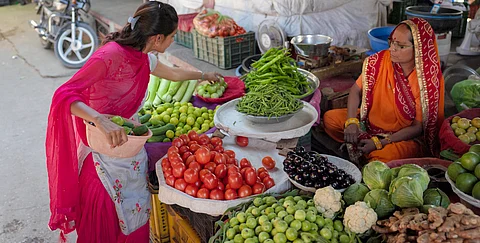

In the Reserve Bank of India (RBI)’s Bulletin August 2024, deputy governor of the central bank Michael Debabrata Patra along with Joice John and Asish Thomas George have flagged how climate change is fuelling food price rise. Their verdict is concerning. Food price rise is now more due to the supply disruption caused by erratic weather and extreme climatic events.
So, the usual demand-supply matrix of determining price is no more due to the usual production and consumption demand interplay. Rather, climate change is impacting the production of crops, and thus the supply side of trade. This has now made food inflation ‘endemic’, as the study terms it.
This is a new reality and can’t be managed through all well-established mechanisms that we deploy to control price. Also, this is concerning as with climate change as the new disruptor in the demand-supply domain, we have two impacts: the producers (farmers, mostly small and marginalised and account for the bulk of India’s poor population) are losing income due to crop losses; and high food price restricts good diet intake, eventually affecting overall nutrition levels.
The study conducted by Patra brings out the fact that in recent decades, climate events have become the dominant reason for food price rise. In the period 2016-2020, the average food inflation was 2.9 per cent. This has more than doubled in the 2020s to an average of 6.3 per cent.
“A key distinguishing factor in this sharp divergence has been the incidence of multiple overlapping supply shocks due to climate events in the more recent period,” says the study. These climate events impact spread and distribution of the monsoon, increasing temperature and impacting crop growth.
While the 2020s mark a period of normal monsoon, the report unveils the already known “highly skewed” distribution of the monsoon. “The broad-based and persistent food inflation that has taken hold during the last four years as a result, belies the conventional notion of food inflation pressures being sector or crop-specific localized factors and transitory,” the study concludes.
Food inflation has become nearly universal in the last four years. For instance, of the last 48 months (June 2020-June 2024), 57 per cent of the months had reported food inflation above 6 per cent. Such is the consistency of supply side disruption due to climatic factors causing high food inflation that the study says that there is no more doubt of it being in transitory nature. This is where the food inflation has become endemic.
Earlier, researchers from the Potsdam Institute for Climate Impact Research and the European Central Bank said global warming would certainly increase inflation, and it could go out of control in specifically developing countries including India.
The impact would be more pronounced in countries like Iraq, Mali, Mauritania and Saudi Arabia. In the case of India, the food inflation will increase by 2 per cent and overall inflation by 1 per cent by 2035.
The world has been talking about the ‘cost of living crisis’ since 2021. Climate change and its manifestation in food price rise, besides other living essentials, have been at core of this crisis. The ‘cost of living crisis’ has led to people eating less food as they are not able to afford it, which in turn reflects on overall health indicators like nutrition security. People are not able to afford the defined ‘health diet’ as well.
There is a serious lack of studies that examine the impact of food price rise on the level of poverty, barring a few anecdotal ones. These studies do indicate co-relations. In the case of India, climate change impacts have led to massive crop damages which impact the income levels of farmers. At the same time, it might have impacted the availability of food for their consumption as well. The high price will deter those who buy food from having an adequate nutritious diet, particularly those who belong to economically marginalised groups.
Senior research fellows in the International Food Policy Research Institute Derek Headey and Marie Ruel have estimated that food inflation resulted in the stunting of children aged 24-59 months. “Even brief nutritional insults in the first 1,000 days of life—from conception to roughly two years of age—can affect a child’s growth for years into the future, and even determine adult stature. We found that a 5% increase in food prices in the prenatal period increases the risk of subsequent stunting by 1.6% and severe stunting by 2.4%, consistent with food price shocks raising the risk of wasting among newborns and infants,” they concluded.